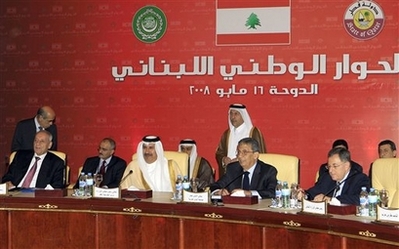 Rival Lebanese leaders made progress on issues at the heart of their political crisis on Sunday but Qatari-mediated talks face major hurdles to a deal to pull Lebanon back from a civil war. Qatari Prime Minister Sheikh Hamad bin Jassim bin Jabr al-Thani met with members of th epro-government and opposition end a crisis that has paralyzed the government and left Lebanon with no president. But delegates said Sheikh Hamad had yet to win final approval on one of the prickliest issues on the agenda — the shape of a new government — after making several proposals including one to split seats three ways equally among rivals. A six-member committee created on Saturday to lay the framework for a new election law has made progress and was now working out the details of how to divide Beirut electorally. Delegates said Sheikh Hamad brought together Prime Minister Fouad Siniora and Parliament Speaker Nabih Berri, a senior opposition leader, for the first time in 18 months as part of efforts to solve the crisis that has left Lebanon with no president and taken it close to civil war. Delegates said the differences were slowly narrowing over the two key issues on the agenda — a new election law and power-sharing in the government.
Rival Lebanese leaders made progress on issues at the heart of their political crisis on Sunday but Qatari-mediated talks face major hurdles to a deal to pull Lebanon back from a civil war. Qatari Prime Minister Sheikh Hamad bin Jassim bin Jabr al-Thani met with members of th epro-government and opposition end a crisis that has paralyzed the government and left Lebanon with no president. But delegates said Sheikh Hamad had yet to win final approval on one of the prickliest issues on the agenda — the shape of a new government — after making several proposals including one to split seats three ways equally among rivals. A six-member committee created on Saturday to lay the framework for a new election law has made progress and was now working out the details of how to divide Beirut electorally. Delegates said Sheikh Hamad brought together Prime Minister Fouad Siniora and Parliament Speaker Nabih Berri, a senior opposition leader, for the first time in 18 months as part of efforts to solve the crisis that has left Lebanon with no president and taken it close to civil war. Delegates said the differences were slowly narrowing over the two key issues on the agenda — a new election law and power-sharing in the government.
The 14 political leaders in Qatar did not meet again after a first session on Saturday. Instead, a joint committee tasked with addressing an electoral law for a parliamentary poll due next year began work. "We are trying to resolve differences," opposition MP and committee member Ali Hasan Khalil told reporters. The factions differ on the delineation of constituencies, fearing they would lose parliamentary seats due to demographic changes which would follow any alteration of boundaries. Election laws have always been a sensitive subject in Lebanon, a patchwork of religious sects where redrawing constituencies can have a dramatic impact on voting results. A deal would lead to the election of army commander General Michel Suleiman as president. Both sides have accepted his nomination for a post reserved for a Maronite Christian in Lebanon’s sectarian power-sharing system. "We are still leaving an opportunity because we still see the chance of reaching an understanding and this is what we came for," Hezbollah MP Mohammed Raad told his party’s al-Manar TV. Former President Amine Gemayel said to reporters: "I think we have resolved 90 percent of the hurdles facing the new election law. We have some obstacles left regarding some electoral constituencies," said Amin Gemayel, a former president and member of the ruling coalition. "Hopefully, by evening we will have published a joint vision. We have to reach a solution in the end." Qatari Prime Minister Sheikh Hamad bin Jassim bin Jabr al-Thani had yet to win final approval on the shape of a new government but had made several proposals, including one to split seats three ways equally among rivals, delegates said. Secretary General Amr Moussa told Free Lebanon radio he expected "today to be a decisive day" at the Qatar talks that seek to end the 18-month political stalemate and facilitate the election of a president after a 6-month vacuum.
Please click read more for more pictures
-
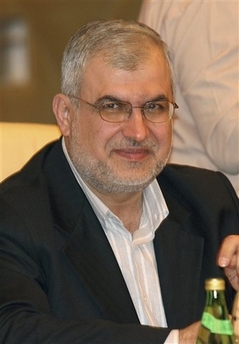
-
In this picture released by the Lebanese official photographer Dalati Nohra, Opposition and the head of Hezbollah bloc in the Leabnese Parliament, Mohammed Raad, who also represent Hezbollah leader Sheik Hassan Nasrallah, attends the opening session of the Lebanese dialogue held in Doha, Qatar, Saturday May 17, 2008. Leaders of Lebanon’s U.S.-backed government and the Hezbollah-led opposition met behind closed doors in Qatar on Saturday for the highest-level talks so far in the 18-month-long political crisis in Lebanon. (AP Photo/Dalati Nohra, HO)
AP via Yahoo! News – May 17 8:49 AM
-
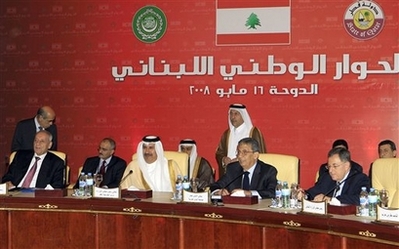
-
in this picture released by the Lebanese official photographer Dalati Nohra, Lebanese Prime Minister, Fuad Saniora, right, Arab league Secretary General Amr Moussa, second right, Prime and Foreign Minister Sheik Hamad bin Jassem Al Thani, center, and Lebanese Parliament Speaker Nabih Berri, left, attend the opening session of the Lebanese dialogue held in Doha, Qatar, Saturday May 17, 2008. Leaders of Lebanon’s U.S.-backed government and the Hezbollah-led opposition met behind closed doors in Qatar on Saturday for the highest-level talks so far in the 18-month-long political crisis in Lebanon. (AP Photo/Dalati Nohra, HO)
- AP via Yahoo! News – May 17 8:45 AM
-
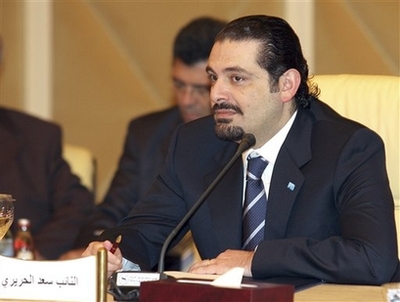
-
In this picture released by the Lebanese official photographer Dalati Nohra, Pro-government and Lebanese parliamentary majority leader, Saad Hariri, attends the opening session of the Lebanese dialogue held in Doha, Qatar, Saturday May 17, 2008. Leaders of Lebanon’s U.S.-backed government and the Hezbollah-led opposition met behind closed doors in Qatar on Saturday for the highest-level talks so far in the 18-month-long political crisis in Lebanon. (AP Photo/Dalati Nohra, HO)
AP via Yahoo! News – May 17 8:52 AM
-
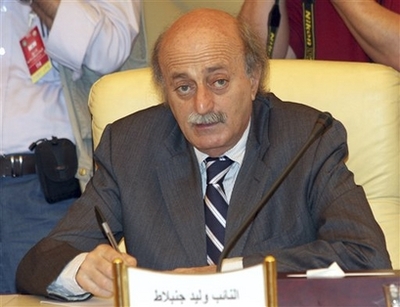
-
In this picture released by the Lebanese official photographer Dalati Nohra, Pro-Government and Lebanese druse leader Walid Jumblatt, attends the opening session of the Lebanese dialogue held in Doha, Qatar, Saturday May 17, 2008. Leaders of Lebanon’s U.S.-backed government and the Hezbollah-led opposition met behind closed doors in Qatar on Saturday for the highest-level talks so far in the 18-month-long political crisis in Lebanon. (AP Photo/Dalati Nohra, HO)
AP via Yahoo! News – May 17 8:54 AM
-
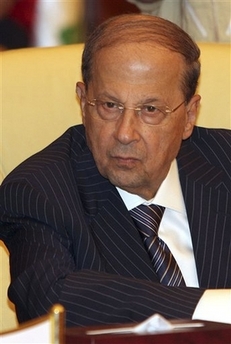
-
In this picture released by the Lebanese official photographer Dalati Nohra, Lebanese Christian opposition leader, Michel Aoun, attends the opening session of the Lebanese dialogue held in Doha, Qatar, Saturday May 17, 2008. Leaders of Lebanon’s U.S.-backed government and the Hezbollah-led opposition met behind closed doors in Qatar on Saturday for the highest-level talks so far in the 18-month-long political crisis in Lebanon. (AP Photo/Dalati Nohra, HO)
AP via Yahoo! News – May 17 8:48 AM
-
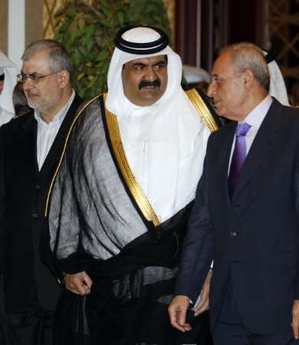
-
Qatari Emir Sheikh Hamad bin Khalifa al-Thani (C)chats with Lebanese Parliament house speaker Nabih Berri (R) and Hezbollah Siniore official Mohammed Raad (L) on their first meeting in Doha May 16, 2008. REUTERS/ Fadi al-Assaad (QATAR)
-
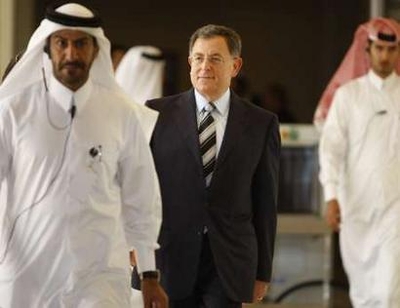
-
Lebanon’s Prime Minister Fouad Siniora walks to a meeting on the second day of dialogue in Doha May 17, 2008. Lebanon’s rival leaders hold talks in Qatar on Saturday to try to end a political conflict that has pushed their country to the brink of a new civil war. REUTERS/Fadi al-Assaad (QATAR)
-
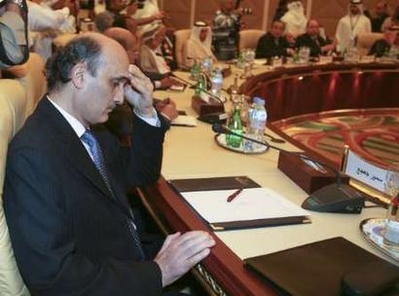
-
Lebanon’s pro-government Christian leader Samir Geagea reacts during the second day of talks in Doha May 17,2008. Lebanon’s rival leaders held tense talks in Qatar on Saturday to try to end a political conflict that has pushed their country to the brink of a new civil war but face major hurdles to reaching a deal. REUTERS/Fadi al-Assaad (QATAR)
Reuters via Yahoo
-
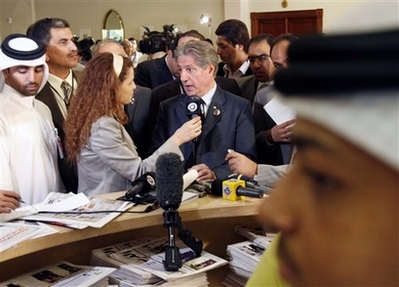
-
Former Lebanese President Amin Gemayel, center,is seen, during a press conference, Sunday, May 18, 2008, in Doha, Qatar. Feuding Lebanese factions meeting in Qatar for high-level talks in the country’s 18-month political crisis are trading accusations. (AP Photo/Hasan Jamali)
AP via Yahoo! News – May 18 6:30 AM
-
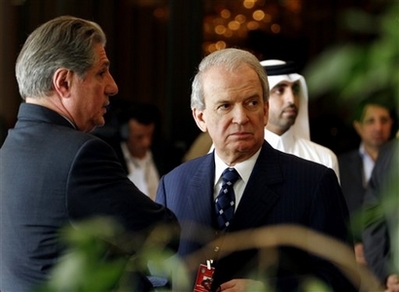
-
Former Lebanese President Amin Gemayel, left, chats with Lebanese Telecommunications Minister Marwan Hamadeh, center, as Hezbulla member of parliament Hussein Haj Hassan is seen at right, Sunday, May 18, 2008, in Doha, Qatar. Feuding Lebanese factions meeting in Qatar for high-level talks in the country’s 18-month political crisis are trading accusations. (AP Photo/Hasan Jamali)
-
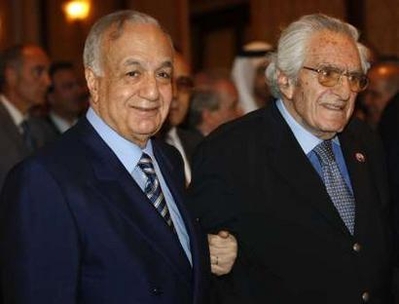
-
Lebanon’s Christian leaders Michel al-Murr (L) and Ghassan Toweiny arrive for a meeting in Doha May 16, 2008. Qatar’s emir formally opened talks on Friday between rival Lebanese leaders which aim to resolve a protracted political conflict that has pushed their country to the brink of a new civil war. REUTERS/ Fadi al-Assaad (QATAR)
Reuters via Yahoo! News – May 16 1:35 PM
-
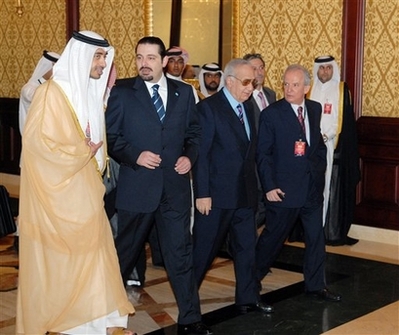
-
From left, UAE Foreign Minister Abdallah bin Zayed al-Nahyan, Saad Hariri, Lebanese parliamentary majority leader, Lebanon’s Christian politician Michel al-Murr and Druze Telecommunications minister Marwan Hemadeh, look on prior to a meeting in Doha, Saturday, May 17, 2008. Lebanon’s squabbling political leaders held a meeting in Qatar for talks brokered by the Arab League aimed at ending a long-running feud. (AP Photo/Sam Diaz) (AP Photo/ Sam Diaz)
-
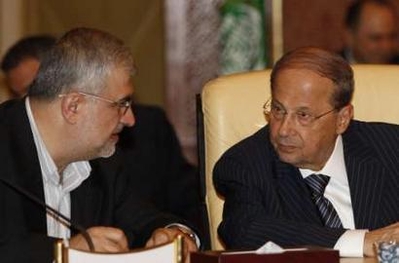
-
Lebanon’s Hezbollah senior official Mohammed Raad (L) speaks with opposition Christian leader Michel Aoun during the second day meeting talks in Doha May 17,2008. Lebanon’s rival leaders held tense talks in Qatar on Saturday to try to end a political conflict that has pushed their country to the brink of a new civil war but face major hurdles to reaching a deal. REUTERS/ Fadi al-Assaad (QATAR
-
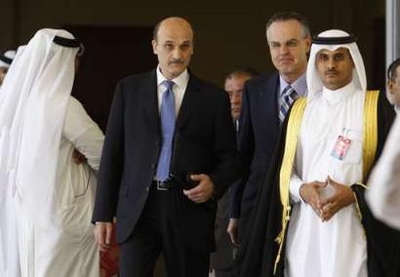
-
Lebanon’s pro-government Christian leader Samir Geagea walks his colleague George Edwan (R) for the second day talks in Doha May 17, 2008. Lebanon’s rival leaders held tense talks in Qatar on Saturday to try to end a political conflict that has pushed their country to the brink of a new civil war but face major hurdles to reaching a deal. REUTERS/Fadi al-Assaad (QATAR)
-
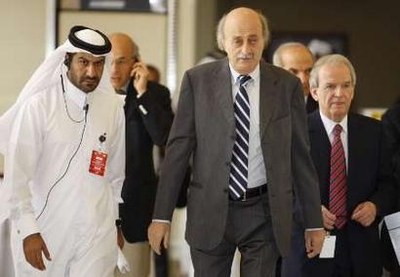
-
Lebanon’s Druze leader Walid Jumblatt (C) walks his colleague Marwan Hemadeh (R) to a meeting on the second day of talks in Doha May 17, 2008. Lebanon’s rival leaders hold talks in Qatar on Saturday to try to end a political conflict that has pushed their country to the brink of a new civil war. REUTERS/Fadi al-Assaad (QATAR)
-
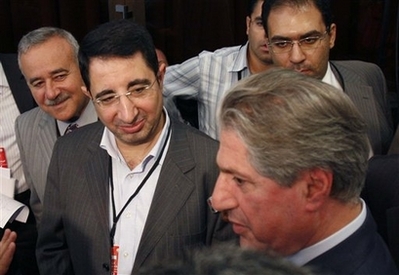
-
Former Lebanese President Amin Gemayel, right, and Hezbulla member of parliament Hussein Haj Hassan, center, talk to reporters Sunday, May 18, 2008, in Doha, Qatar. Feuding Lebanese factions meeting in Qatar for high-level talks in the country’s 18-month political crisis are trading accusations. (AP Photo/Hasan Jamali)
AP via Yahoo! News – May 18 6:26 AM
-
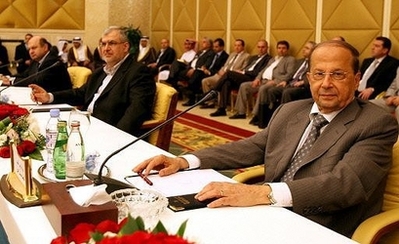
-
Christian opposition leader Michel Aoun (R), Hezbollah MP Mohammed Raad (C) and Christian opposition MP Joseph Skaff attend the opening session of Arab League sponsored talks in Doha. The United States voiced support Friday for talks in Qatar aimed at ending Lebanon’s sectarian clashes while hoping from afar that Hezbollah does not turn its military gains into political ones.(AFP/Marwan Naamani)



